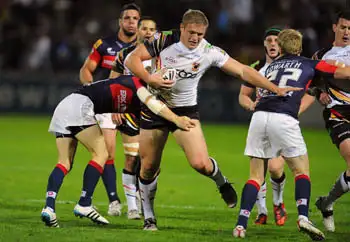Steve Mascord column: Love the off-season

There are plenty of people in Australia and New Zealand who have never before heard of this new rule, the free play, that is being trialed in the NRL Nines.
Sure, between 20,000 and 60,000 people get up at 5am to watch Super League in Australia. And Super League has allowed a risk-free adventurous play on the first tackle after a turnover for years. But top Friday night NRL ratings are measured in the hundreds of thousands.
Super League is largely a mystery to Aussie Rugby League fans … the way Iron Maiden or the Boomtown Rats are mysteries to the hoards who line the pockets of Justin Beiber and One Direction.
But experimental rules are not the only things the Antipodeans are learning from Super League right now. Increasingly, they’re learning what it is like to be the fall-back option, the second choice, the patsy of big names.
Most Australian coaches and players who take jobs in Britain and France will have a get-out clause that allows them to leave immediately if they get a job back in the NRL. British clubs and fans are just asked to accept that the NRL is best and if you want the services of these celebrated individuals, you get them on their terms.
But Tom Burgess’ foray into the NFL is showing that while the NRL maybe be further up the food chain from Super League, it is nowhere near the top.
Forget the spin from South Sydney that the England prop is in the north-eastern United States to ‘better himself’. He is a contracted elite athlete of international standing who is risking injury to trial for a contract in another professional sport.
It’s humbling, even humiliating, for rugby league that we don’t even see ourselves as being on the same level as American Football and will happily have him back if he doesn’t get a contract.
It’s also a completely fair reflection of where we are.
Jarryd Hayne, the best player in our best competition, would also rather trial in another sport than play ours.
Sam Burgess, our international player of the year in 2014, would rather try to make the England rugby union team that autumn than actually play for the country’s rugby league team.
He left with two years remaining on his South Sydney contract and was welcomed back when things didn’t work out for him.
Sonny Bill Williams can walk onto Soldier Field and Twickenham within a month of playing in the NRL finals, having left because another sport has a bigger World Cup and is included in the Olympics.
I’ve been warning about globalisation for years, arguing that rugby league does not really have a choice as to whether or not to market itself more widely and attack foreign markets. It doesn’t really have a choice whether it should rationalise it’s competitions to increase pay packets, put more focus on international competition and seek recognition for pan-sport organisations such as the IOC.
The choice, rather, is whether or not it wants to survive. Globalisation means other sports will grab the imagination of the next generation the way every other global brand does.
If you’re not part of the movement, you’re the local corner store. And we all know what happens to them in the end.
There will be no ‘local’ anything in a century – maybe less.
Our playing base has already been significantly compromised – at the top – by our refusal to grasp this basic truth.
Our fan base is next.
Follow on Twitter @WClubChallenge